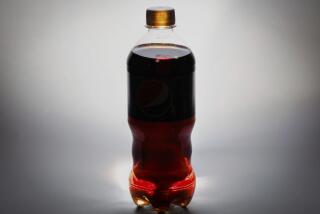Go Ahead, Throw Some Shrimp on the Barbie--Occasionally
- Share via
You know what they say: Be careful what you ask for. We have been asking for your questions and comments for some time now, and we have received an absolutely overwhelming response.
On the one hand, it’s good to know what readers are interested in reading in this column. On the other hand, we regret that we cannot answer more of your questions. So today’s the day to make a little dent in the pile.
Question: Is shrimp really high in cholesterol and does smoking contribute to high cholesterol? (D.I., Banning)
Answer: The short answer to both questions is yes. However, in the case of shrimp, although it is high in cholesterol, it has very little fat. It appears that saturated fat probably contributes more to blood cholesterol levels than dietary cholesterol, so there is no reason why shrimp (and other shellfish) cannot be included in a healthful diet. Try not to sabotage it with creamy sauces or deep-frying and, of course, as with everything else, moderation is the key.
As for the second part of the question, this is just another of the many, many reasons not to smoke. Smoking tends to raise total cholesterol levels and lower HDL (the good cholesterol). If you needed another reason to quit, this is a good one.
Q: Can you tell me something about the sugar substitute Equal? (SJC, Redlands) Where is Sunette available? (RKS, via e-mail).
A: These two sugar substitutes are widely available. Equal, which is another name for aspartame, is the same as Nutrasweet. It is among the most heavily researched substances and, despite some ridiculous Internet rumors that have circulated widely, it appears to be quite safe, except for people with a rare genetic disorder known as phenylketonuria.
Sunette is actually acesulfame K and is also available under the trade name Sweet One. Unlike aspartame, it can be used in baked goods and other heated foods. Because it passes through the body completely unchanged, it is thought to be quite safe for long-term use. If you have trouble finding it, check with the pharmacist at a large drugstore.
Q: I’m very confused about ground beef. What does it mean when it says 90% lean? (M.N., Erie, Pa.)
A: You are not alone in your confusion. The labels on ground beef are confusing for everybody. When ground beef says it is 90% lean (10% fat), this means that 10% of the weight of the ground beef is fat. It is not the percentage of calories from fat. In fact, a 3 1/2-ounce raw patty made with 90% lean ground beef can get about half of its calories from fat.
The following chart might help:
*--*
Fat Content Total Calories Percent (by weight) (per 100 g of Calories or 3.5 ounces) from Fat 10% 175 51 15% 220 61 20% 260 70 25% 300 75
*--*
*
It’s not hard to tell from this chart why ground beef is the third-biggest source of saturated fat in the American diet (cheese and whole milk are first and second). These figures are for raw beef, but cooking reduces the percentage of fat calories by only about 10%.
Q: You’ve talked about a lot of fruits but have never mentioned pomegranates. (S.P., Orlando, Fla.).
A: Like all fruits and vegetables, pomegranates have lots of health benefits. In addition, some recent research has shown that pomegranates have antioxidants and other substances that seem to be anti-inflammatory in nature. They also seem to have some of the same good phytochemicals (plant compounds believed to have numerous health benefits) that have been identified in red wine, tea and soy. The more variety you can get in your fruit and vegetable intake, the better your chances for ingesting the full range of healthful substances they contain.
Q: I’ve been hearing about more and more car crashes that are supposedly caused by someone taking kava. What can you tell me about it? (J.P., Century City)
A: Kava is another one of those so-called natural products that you can buy just about anywhere, never knowing exactly what you’re getting or what effect (if any) it might have on you and without any guarantee that it is safe. It is promoted as a sedative, muscle relaxant and pain reliever but it is known to be an intoxicating nonalcoholic product that may have potential for being abused. It can be particularly dangerous when taken by children.
In studies of heavy users in Australia, there were reports of such side effects as rashes, weight loss, abnormal reflexes and other bodily disturbances. It has the potential to be a powerful drug on its own and may also intensify the effect of alcohol and other tranquilizers.
And yet, like all herbs, it is available over the counter, without any regulation whatsoever. Our advice is to avoid it.
And finally, here’s an answer without a question. (Nobody actually asked about this, but we think it’s important.)
If you take any dietary supplement or drug and you experience any adverse side effects, you should report it to the Food and Drug Administration. This is the only way to get potentially dangerous substances off the market. Although the FDA cannot regulate these products, it can get bad products off the market if it has enough evidence.
It’s easy to submit a report. Call (800) 332-1088 and ask for a form. You can also download a form from the FDA’s MedWatch Web site (https://www.fda.gov/medwatch). Doctors can, and should, also file such reports when they receive information from patients.
*
Dr. Sheldon Margen is a professor of public health at UC Berkeley; Dale A. Ogar is managing editor of the UC Berkeley Wellness Letter. Send questions to Dale Ogar, School of Public Health, UC Berkeley, Berkeley, CA 94720-7360, or e-mail to daogar@uclink4.berkeley.edu. Eating Smart is published the second and fourth Mondays.
More to Read
Eat your way across L.A.
Get our weekly Tasting Notes newsletter for reviews, news and more.
You may occasionally receive promotional content from the Los Angeles Times.










